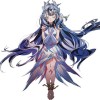The ‘JRPG’ label has always been othering
interesting article for consideration from Polygon writer Kazuma Hashimoto. here's the opening:
In February, Final Fantasy 16 producer Naoki Yoshida sat down in an interview with YouTuber SkillUp as part of a tour to promote the next installment in the Final Fantasy series. During the interview, Yoshida expressed his distaste for a term that had effectively become its own subgenre of video game, though not by choice. "For us as Japanese developers, the first time we heard it, it was like a discriminatory term, as though we were being made fun of for creating these games, and so for some developers, the term can be something that will maybe trigger bad feelings because of what it was in the past," he said. He stated that the first time both he and his contemporaries heard the term, they felt as though it was discriminatory, and that there was a long period of time when it was being used negatively against Japanese-developed games. That term? "JRPG."













Add comment